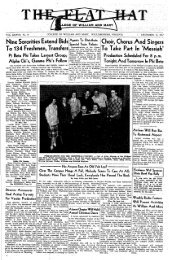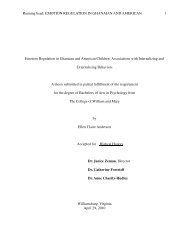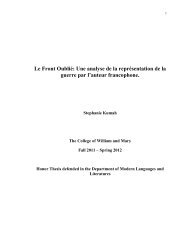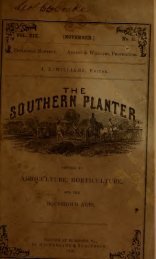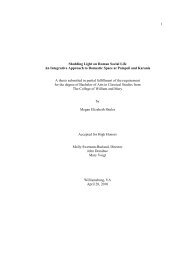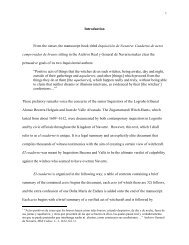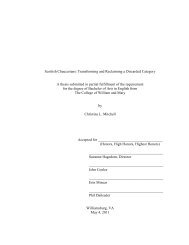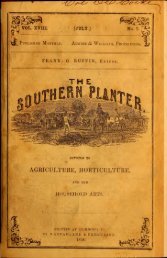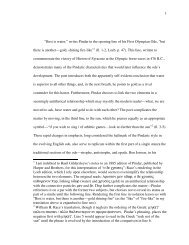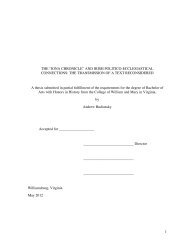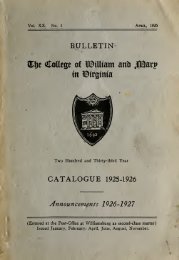Southern planter - The W&M Digital Archive
Southern planter - The W&M Digital Archive
Southern planter - The W&M Digital Archive
Create successful ePaper yourself
Turn your PDF publications into a flip-book with our unique Google optimized e-Paper software.
1859.] THE SOUTHERN PLANTER. 419<br />
crystallization is effected, it is transferred to<br />
coolers, which are large, shallow pans.<br />
When fully cooled, it looks like brown<br />
sugar and molasses mixed. It is then shoveled<br />
from the coolers into hogsheads. <strong>The</strong>se<br />
hogsheads have holes bored in their bottoms;<br />
and, to facilitate the drainage, strips of cane<br />
are placed in the hogsheads, with their ends<br />
in these holes, and the hogshead is filled.<br />
<strong>The</strong> hogsheads are set on open frames, un-<br />
der which are copper receivers, on an in-<br />
clined plane, to catch and carry off the<br />
irippings from the hogsheads. <strong>The</strong>se drip-<br />
pings are the molasses, which is collected<br />
ind put into tight casks.<br />
I believe I have given the entire process.<br />
When it is remembered that all this, in<br />
ivery stage, is going on at once, within the<br />
imits of the mill, it may well be supposed<br />
o present a busy scene. <strong>The</strong> smell of juice<br />
tnd of sugar vapor, in all its stages, is inense.<br />
<strong>The</strong> negroes fatten on it. <strong>The</strong> clank<br />
f the engine, the steady grind of the ma-<br />
hines, and the high, wild cry of the ne-<br />
;roes at the caldrons to the stokers at the<br />
iirnace doors, as they chant out their direcions<br />
or wants—now for more fire, and now<br />
o scatter the fire—which must be heard<br />
bove the din, "A-a-b'la! A-a-b'la!" " E-eha<br />
candela !" " Pu-er-ta !" and the bararic<br />
African chant and chorus of the gang<br />
t work filling the cane-troughs—all these<br />
lake the first visit at the sugar-house a<br />
range experience. But after one to two<br />
isits, the monotony is as tiresome as the<br />
rst view is exciting. <strong>The</strong>re is, literally, no<br />
hange in the work. <strong>The</strong>re are the same<br />
oises of the machines, the same cries from<br />
egroes at the same spots, the same intensesweet<br />
smell, the same state of the work<br />
all its stages, at whatever hour you visit<br />
, whether in the morning, or evening, at<br />
idnight, or at the dawn of the day. If<br />
du wake up at night, you hear the " A-ala!<br />
A-a-b'la!" "E-e-cha! E-e-cha !" of<br />
le caldron—men crying to the stokers,<br />
d the high, monotonous chant of the<br />
ings filling the wagons or the trough, a<br />
lort, improvisated stave, and then the cho-<br />
is-—not a tune, like the song of sailors at<br />
le tackles and falls, but a barbaric, tuue-<br />
ss intonation.<br />
Florida Grass.—Dr. S. S. Mills, of<br />
harleston, S. C, has invented and pat-<br />
lted a machine which prepares the grass<br />
"<br />
the Florida Keys for rope-making.<br />
From Quarterly Journal of Agriculture.<br />
Country and City Life.<br />
(Froin an Address dtUverd at the Tennessee<br />
State Exhibition, 1858.)<br />
BY THE LATE POSTMASTER GEN. BROWN.<br />
In this country the farmer generally holds<br />
an indefeasible title to the broad acres he<br />
cultivates. He moves, proudly over nig<br />
fields, and surveys with satisfaction the crops<br />
which are upon them. But he will not stop<br />
in his money making career to build his<br />
neat cottage, or his more costly mansion, according<br />
to his circumstances. He will not<br />
adorn his grounds, nor plant his orchards of<br />
delicious fruits. He will waste no time on<br />
shrubberry and flowers. He will prepare<br />
no healthful cistern, nor lead the gushing<br />
fountain to his door. All is left rude, inconvenient<br />
and uncomfortable around him,<br />
with nothing to lure either himself or his<br />
family away from the blandishments of some<br />
neighboring town or city. Every farmer<br />
and <strong>planter</strong> should make his home to him-<br />
self and his household the dearest and loveliest<br />
spot on earth. Though he may have<br />
no marble palace, no rich and costly furni-<br />
ture, no liveried servants, still, there is his<br />
homestead beautified and adorned with<br />
every embellishment of taste and fancy.<br />
Who would be willing to leave such a home,<br />
with its Arcadian bowers and its pure and<br />
sparkling waters, for the dust and smoke of<br />
the crowded city 1<br />
And how strange is this passion for city<br />
over country life which we so often encoun-<br />
ter ! It cannot spring from any inordinate<br />
desire to grow rich, for agriculture rewards<br />
her followers more bountifully than any<br />
other pursuit. It is a passion for pleasure<br />
and display more than for riches. Some<br />
men desire to live in palaces built in the<br />
city, that they may be seen and admired.<br />
<strong>The</strong>y desire costly equipages, but they must<br />
glitter in the city, attracting the admiration<br />
of thousands who would never behold them<br />
in the solitude of the country. <strong>The</strong> thea-<br />
tre, the ball, and the masquerade present<br />
their nightly attractions, whilst they are<br />
seldom heard of in rural life. <strong>The</strong> devotee of<br />
more questionable pleasures finds in the<br />
city ready facilities of indulgence, which<br />
are entirely removed in the plain and vir-<br />
tuous organization of country society.<br />
Whatever the motive, this preference given<br />
by so many to city life, is productive of some<br />
of the greatest evils of the present age. In



